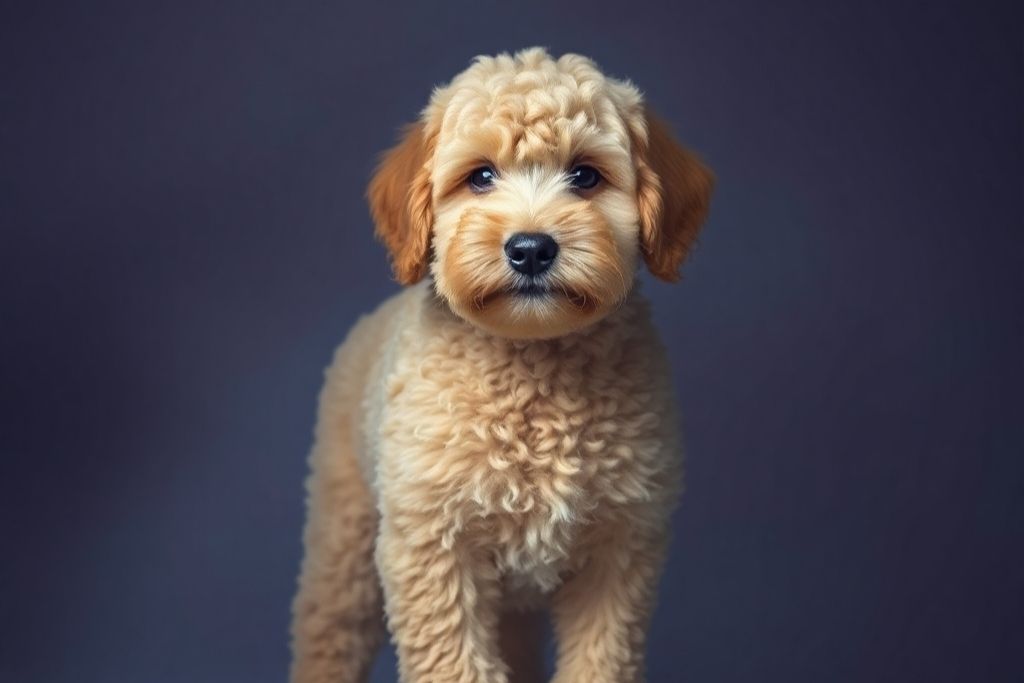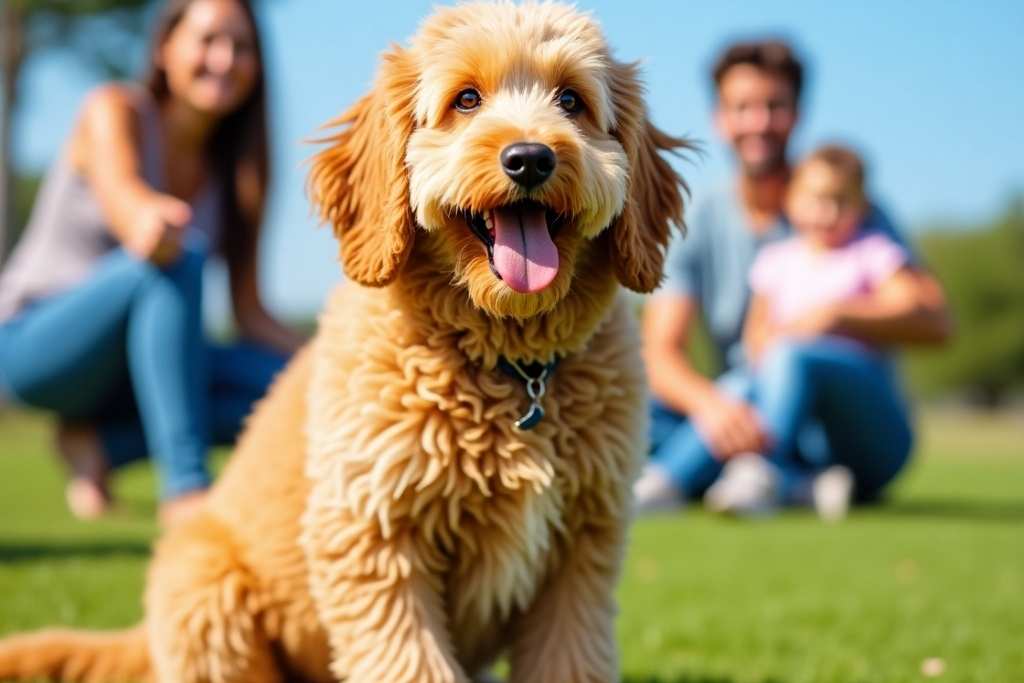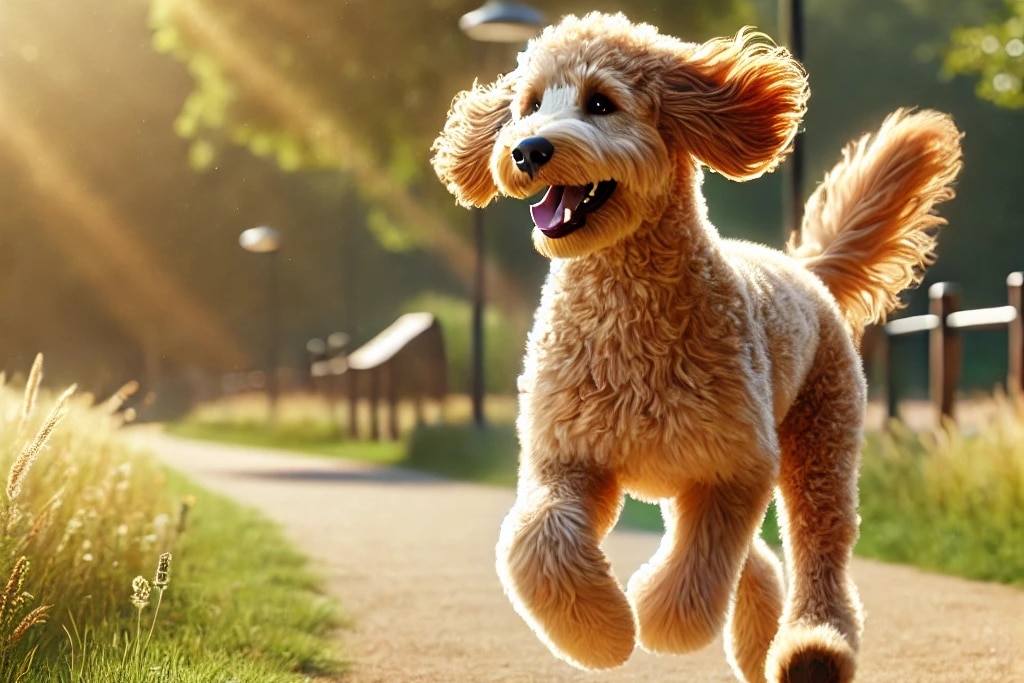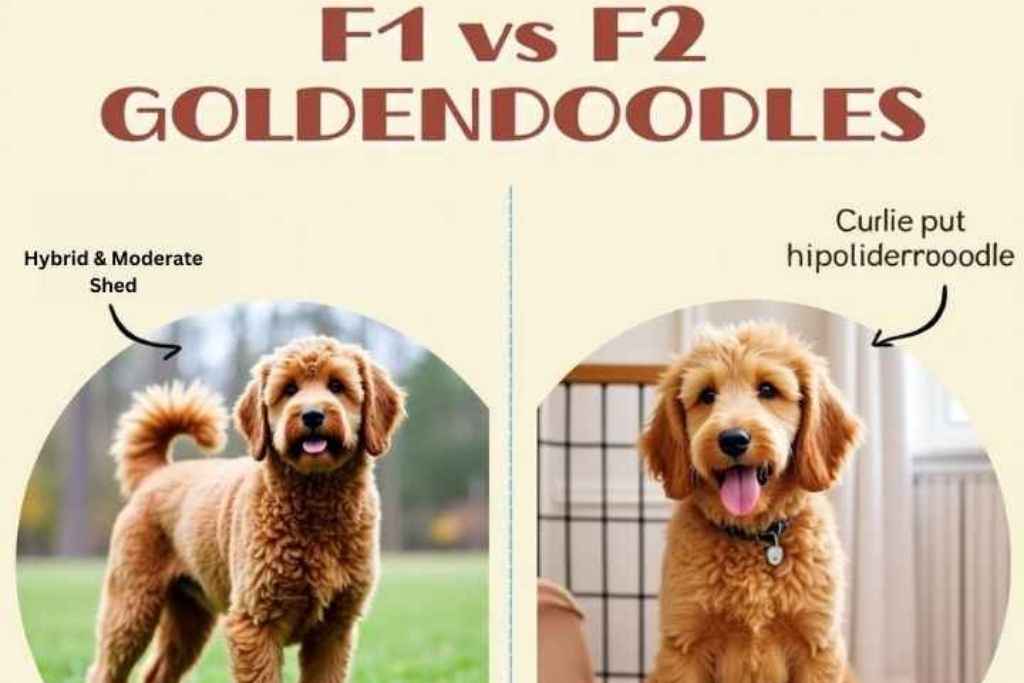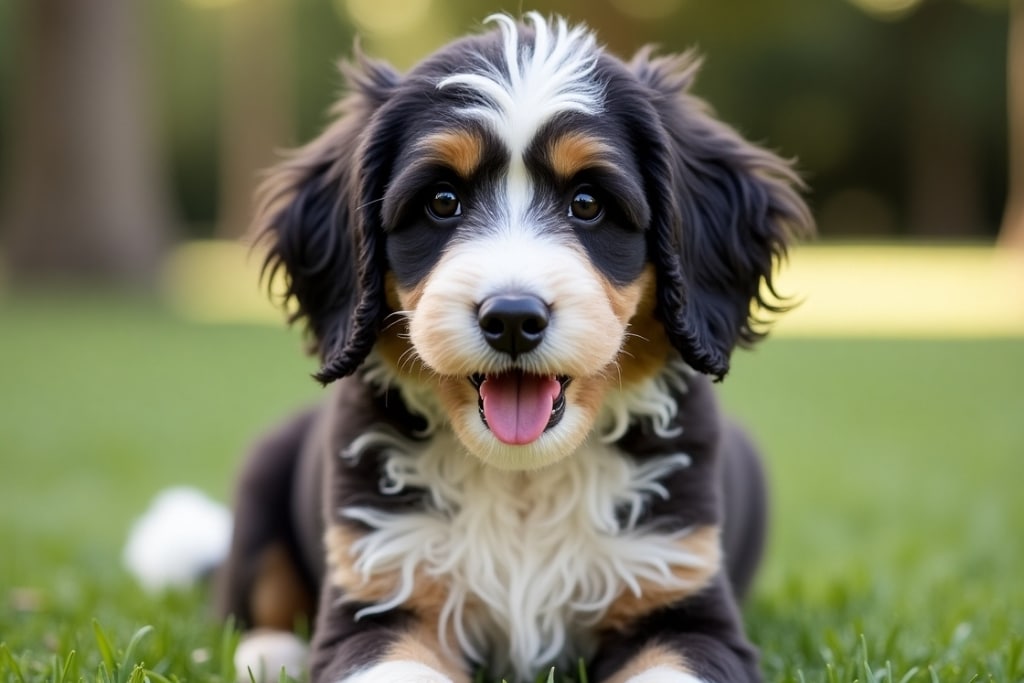Getting started: Learn about the Mini Goldendoodle, a small, friendly, and hypoallergenic dog breed perfect for families. Get insights into its personality, grooming needs, and training tips.
History and Origin of Mini Goldendoodles
The Mini Goldendoodle is a relatively modern hybrid breed, first developed in the United States during the 1990s. Breeders aimed to combine the best traits of two beloved breeds: the Golden Retriever and the Miniature Poodle. The primary goal was to create a smaller, family-friendly dog that inherited the Golden Retriever’s loyal, affectionate nature and the Miniature Poodle’s intelligence and low-shedding coat.
Over the years, Mini Goldendoodles have gained immense popularity, not only because of their charming appearance but also due to their adaptability and suitability as pets for allergy-prone households. Unlike their larger Goldendoodle counterparts,
Mini Goldendoodles are compact, making them ideal for people living in apartments or homes with limited space. Their history reflects the rising trend in designer breeds, catering to families looking for specific traits in a pet, such as companionship, adaptability, and hypoallergenic qualities.
What Do Mini Goldendoodles Look Like?
Mini Goldendoodles are cherished for their adorable, teddy-bear hair cut appearance. They usually have a soft, wavy to curly coat, a round face, and soulful, expressive eyes. Their ears hang down slightly, giving them a playful yet gentle look. Their coats come in a variety of colors, including cream, apricot, red, gold, and sometimes even black or parti-color, depending on their lineage.
First Generation Appearance
First-generation (F1) Mini Goldendoodles are a direct cross between a Golden Retriever and a Miniature Poodle. Their appearance is often a balanced mix of the two parent breeds. They typically have a medium build, floppy ears, and a slightly boxy muzzle, resembling a Golden Retriever but smaller. Their coats can be wavy or curly, with moderate shedding, as they inherit traits from both parents.
Second Generation Appearance
Second-generation (F1B or F2) Mini Goldendoodles often have a more refined appearance. Because these dogs are bred back to a Poodle, they tend to have curlier coats and are more hypoallergenic. Their size and color can still vary, but they generally lean closer to the Poodle parent in appearance, including a slimmer build and more defined curls.
What Size Is a Mini Goldendoodle?
Mini Goldendoodles are small to medium-sized dogs, making them an ideal choice for families or individuals who want a pet that isn’t too large. Their size largely depends on the Miniature Poodle parent’s size and the generation of the dog.
First Generation Size
F1 Mini Goldendoodles typically weigh between 20–35 pounds and stand about 13–20 inches tall at the shoulder. Their size can vary more widely due to the genetic mix of their Golden Retriever and Miniature Poodle parents.
Second, Third, etc., Generation Size
Subsequent generations, like F1B or F2, are generally smaller because they inherit more genes from the Miniature Poodle. These dogs often weigh between 15 to 30 pounds, with a height of 12 to 18 inches. This makes them even more suitable for small living spaces or individuals seeking a compact yet active dog.
Miniature Goldendoodle Breed Standard
While Mini Goldendoodles are not recognized as an official breed by kennel clubs like the AKC, they do have a widely accepted set of characteristics among breeders. They should exhibit a balanced build, a soft, wavy, or curly coat, and a friendly, outgoing expression.
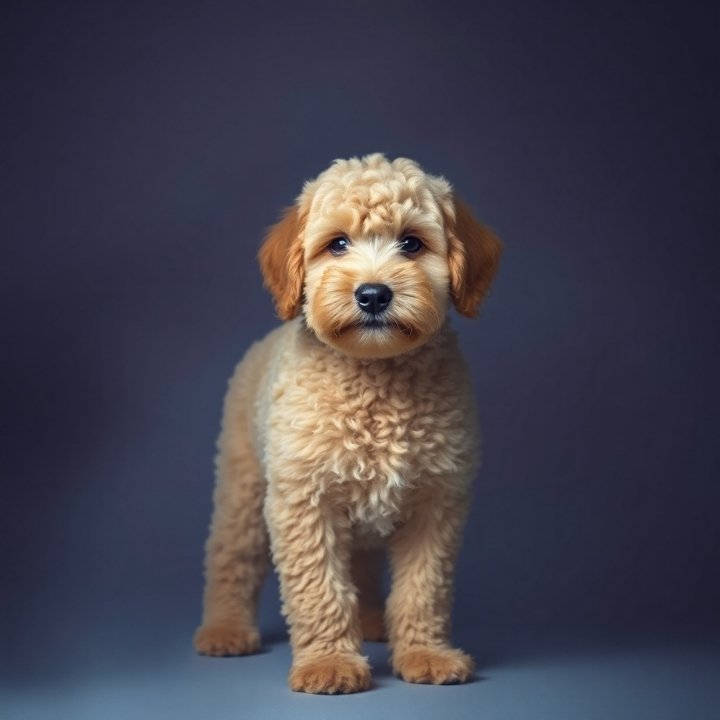
Their coats are typically low-shedding, and their size should be compact but proportionate. Because they are a mixed breed, their appearance can vary slightly based on their lineage and generation.
Temperament of Mini Goldendoodle
Mini Goldendoodles are known for their cheerful and affectionate personalities. They are incredibly friendly dogs, making them an excellent choice for families with children or other pets.
Friendly and Great With Kids and Other Pets
Mini Goldendoodles are gentle and patient, making them great companions for young children. They tend to get along well with other animals, including cats and other dogs, as long as they are properly socialized from a young age.
Outgoing and Always Happy
These dogs are naturally outgoing and thrive on interaction with people and other pets. They are eager to please, making them a delight to have in social settings.
Smart and Easy to Train
Mini Goldendoodles inherit intelligence from their Poodle parents, making them quick learners. They respond well to positive reinforcement training methods and enjoy learning tricks and commands.
Health and Wellness of Mini Goldendoodle Puppies
Mini Goldendoodles are generally healthy dogs, but like all breeds, they can be prone to specific health conditions. Their overall health depends on genetics, diet, exercise, and regular veterinary care.
Epilepsy
While rare, some Mini Goldendoodles can be prone to epilepsy, a neurological disorder that causes seizures. This condition is typically genetic, and reputable breeders test for it. Epilepsy can be managed with medication, and affected dogs can live happy, healthy lives with proper care.
Hip, Joint, and Other Mobility Issues
Mini Goldendoodles can inherit hip dysplasia, a condition where the hip joint doesn’t develop properly, leading to pain and mobility issues. Regular vet check-ups, a healthy weight, and appropriate exercise can help prevent or manage this condition.
What Health Problems Do Mini Goldendoodles Have?
In addition to epilepsy and hip dysplasia, Some common Mini Goldendoodles may be prone to eye conditions, such as progressive retinal atrophy (PRA), and certain allergies. It’s essential to find a breeder who tests their breeding dogs for common genetic issues to reduce the likelihood of these health problems. Regular vet visits and maintaining a healthy lifestyle can help keep your Mini Goldendoodle healthy.
Breeders Will Have Insight on Their Genetic History
Reputable breeders will provide you with information about the genetic history of the Mini Goldendoodle puppies, including health clearances and testing results. Knowing the lineage of your Mini Goldendoodle can help you understand potential health risks and ensure that you’re getting a puppy with a healthy genetic background.
Common Genetic Conditions for Golden Retrievers and Miniature Poodles
Golden Retrievers are prone to hip dysplasia, elbow dysplasia, and heart disease, while Miniature Poodles can have issues such as progressive retinal atrophy and epilepsy. By carefully selecting breeders who test for these conditions, Mini Goldendoodles may inherit fewer health problems.
May See Less Genetic Illnesses
Since hybrid dogs inherit a mix of genes from both parents, they may experience fewer genetic disorders compared to purebred dogs. However, Mini Goldendoodles can still inherit conditions from either parent breed, so it’s important to choose a breeder who conducts health screenings and genetic testing to reduce the risk of inherited health problems.
Adaptability of Mini Doodle
Mini Goldendoodles are known for their high adaptability, making them perfect companions for various living situations. Their temperament and size allow them to thrive in both urban and rural environments, provided their basic needs, such as exercise and social interaction, are met.
Suitable for Most Climates
Mini Goldendoodles have a thick, wavy coat that can adapt to a variety of climates. While they may do well in cooler temperatures due to their dense coat, they are also comfortable in warmer weather, provided they have access to shade and plenty of water.
Can Live in an Apartment or on a Farm
Yes, Mini Goldendoodles are great apartment dogs. Their moderate size and calm demeanor make them well-suited for living in small spaces. However, they still need regular exercise and mental stimulation.
Daily walks, playtime, and the opportunity to interact with their family will keep them happy and healthy in an apartment setting.
Great for Families and Singles
Whether you’re part of a large family or a single person looking for a loyal companion, Mini Goldendoodles thrive in both environments. They are affectionate, playful, and always eager to please, making them excellent pets for people of all ages and lifestyles.
Generations Of Goldendoodle
The generation of a Mini Goldendoodle refers to the specific breeding combination between a Golden Retriever and a Miniature Poodle. The generation can impact the dog’s size, coat type, and overall temperament.
First Generation Miniature Goldendoodle (F1)
First-generation Mini Goldendoodles (F1) are the direct result of breeding a Golden Retriever with a Miniature Poodle. These dogs tend to have a mix of the parents’ characteristics, including a range of coat types from wavy to curly and moderate shedding. Their size and temperament are typically more variable.
Second Generation Miniature Goldendoodle (F1B)
The second generation (F1B) is created by breeding a Mini Goldendoodle back to a Miniature Poodle. This breeding often results in a dog that has a curlier, low-shedding coat and a more predictable size and temperament. The F1B Mini Goldendoodle is often a good choice for people with allergies due to its higher percentage of Poodle genetics.
Third Generation Miniature Goldendoodle (F2)
F2 Mini Goldendoodles are produced by breeding two F1 Mini Goldendoodles. This generation can display a wider variety of coat types and sizes, but they are still generally small and friendly. The F2 generation is less common than F1 and F1B, but they can make excellent pets due to their mix of genes.
Coat Colors
Mini Goldendoodles come in a variety of coat colors, reflecting the mix of Golden Retriever and Miniature Poodle genetics. Common colors include gold, cream, red, apricot, and sometimes black or a mix of these.
The coat colors may vary slightly, and they can even change as the puppy matures.
Coat Types
Mini Goldendoodles can have one of three types of coats:
- Wavy Coat
- Curly Coat
- Straight Coat
Activity
Mini Goldendoodles are moderately active. They require daily exercise to stay healthy and happy, such as walks, playtime, and mental stimulation. Although they are not as energetic as larger breeds, they enjoy active play and time spent with their families.
Are Mini Goldendoodles Energetic?
While not hyperactive, Mini Goldendoodles have a playful and energetic nature. They enjoy moderate exercise, such as daily walks and interactive play with their owners.
Daily Exercise Needs
Mini Goldendoodles need around 30–60 minutes of exercise per day. This can include a walk, playtime, or some time spent running around in a secure yard. They also benefit from mental stimulation through training and puzzle toys.
Moderate Exercise Needs
Their moderate exercise needs make them ideal for active families who enjoy daily outdoor activities, but they’re also happy with less strenuous outings.
Service/Therapy Dogs
Mini Goldendoodles have the temperament and intelligence needed to excel as service and therapy dogs. Their friendly and eager-to-please nature makes them highly trainable and ideal for tasks like emotional support or assisting those with disabilities.
Are Mini Goldendoodles Good Service Dogs?
Yes, Mini Goldendoodles are excellent candidates for service and therapy work. Their intelligence, trainability, and gentle temperament make them highly effective in roles where they provide assistance and emotional support.
These dogs inherit their intelligence from the Poodle and their loyal, affectionate nature from the Golden Retriever, creating a perfect balance for service-oriented tasks.
Health of Goldendoodle
Mini Goldendoodles are considered healthier than many purebred dogs due to their hybrid vigor. This means that their genetic diversity often reduces the likelihood of inheriting breed-specific diseases. However, like all dogs, they require proper care and regular veterinary check-ups to ensure they remain healthy and active throughout their lives.
Staying Healthy
Maintaining your Mini Goldendoodle’s health involves a combination of a balanced diet, regular exercise, grooming, and routine vet visits. Early health screenings and vaccinations are critical for puppies, as they help prevent common illnesses and provide a strong foundation for lifelong wellness.
How to Care for a Mini Goldendoodle?
Caring for a Mini Goldendoodle involves attention to their physical, emotional, and social needs. They are highly social dogs that thrive on interaction with their families. Proper care includes:
- Diet: Feeding them high-quality dog food appropriate for their size and activity level.
- Exercise: Providing daily exercise to keep them physically and mentally stimulated.
- Grooming: Regular brushing, bathing, and trimming to maintain their low-shedding coat.
- Training: Consistent training sessions to reinforce good behavior and provide mental stimulation.
- Health Check-ups: Scheduling regular veterinary visits to monitor their health.
What Should a Mini Goldendoodle Eat?
Mini Goldendoodles require a diet rich in protein, healthy fats, and essential nutrients to support their energy levels and overall health. High-quality commercial dog food or a well-balanced homemade diet approved by a veterinarian is ideal.
Puppies require more frequent meals, while adult dogs do well with two meals per day. Always ensure they have access to fresh water and avoid feeding them table scraps or foods toxic to dogs, such as chocolate, grapes, or onions.
Crating Your Mini Goldendoodle
Crate training can be a useful tool for Mini Goldendoodles, providing them with a safe, comfortable space to rest and relax. Ensure the crate is appropriately sized, not too big or too small and use positive reinforcement to create a positive association with the crate.
It’s important to avoid using the crate as punishment and to allow your dog plenty of time outside the crate for exercise and social interaction.
Do Mini Goldendoodles Shed?
One of the most attractive features of Mini Goldendoodles is their low-shedding coat, which is inherited from their Poodle parent. This trait makes them a popular choice for individuals with allergies or those who prefer a cleaner home. While no dog is completely hypoallergenic, Mini Goldendoodles produce significantly less dander than many other breeds.
Goldendoodle Grooming
Mini Goldendoodles require regular grooming to maintain their coat’s health and appearance. Grooming needs depend on the coat type:
- Wavy Coat: Brush 2–3 times per week to prevent tangles.
- Curly Coat: Daily brushing is ideal to avoid matting.
- Straight Coat: Requires less maintenance but still benefits from weekly brushing.
Professional grooming every couple of months ensures their coat stays in optimal condition.
Do You Need to Groom a Mini Goldendoodle?
Yes, grooming is an essential part of caring for a Mini Goldendoodle. Their coat requires regular brushing (2 to 3 times per week) to prevent tangles and mats. Depending on the coat type, professional grooming may be needed every 6 to 8 weeks for trims and maintenance.
Grooming Needs for a Miniature Goldendoodle
- Brushing: Prevents tangles and removes loose fur.
- Bathing: Keeps their coat clean and reduces odors. Use a dog-specific shampoo.
- Trimming: Keeps their coat length manageable and prevents mats.
- Nail Care: Regular nail trimming to prevent overgrowth.
- Ear Cleaning: Keeps their ears free of wax and dirt to prevent infections.
Goldendoodle Puppy Culture
Mini Goldendoodles benefit greatly from early socialization and exposure to different environments, people, and other animals. This early socialization, often referred to as “puppy culture,” ensures they grow up to be well-rounded, confident, and friendly dogs.
Breeders who emphasize puppy culture practices set a solid foundation for their puppies to succeed in their future homes.
Lifespan of the Mini Goldendoodle:
The lifespan of a Mini Goldendoodle can vary depending on its generation. Typically, the Miniature Poodle has a longer life expectancy, living between 11-15 years, while the Golden Retriever averages a lifespan of 10-12 years.
As a hybrid of these two breeds, the Mini Goldendoodle often falls in the middle, living anywhere between 12 to 15 years. The dog’s lifespan may also be influenced by factors like genetics, diet, exercise, and overall health care.
Are Mini Goldendoodle Puppies Right for You?
Mini Goldendoodle puppies are a fantastic choice for families, singles, or seniors looking for a loyal, affectionate, and low-shedding pet. They are easy to train, adapt to various living situations, and get along well with children and other animals. However, they require regular grooming, daily exercise, and consistent training, so they are best suited to owners who are prepared to meet these needs.
Private Breeder Tips and Concerns
Tips When Buying From a Private Breeder
When purchasing a Mini Goldendoodle from a breeder, it’s crucial to research and verify the breeder’s credibility. Look for breeders who are transparent about the dog’s genetic history and health testing. They should provide health clearances for the parent dogs, particularly for common conditions like hip dysplasia, heart issues, and progressive retinal atrophy (PRA).
Ask to visit the breeder’s facility to see the environment where the puppies are raised. A reputable breeder will prioritize the well-being of the dogs and ensure that the puppies are socialized and healthy. Avoid breeders who seem overly focused on profit or who are unwilling to answer your questions.
Uniqueness of Goldendoodle
Mini Goldendoodles have a unique charm that sets them apart from many other breeds. They combine the intelligence of a Miniature Poodle with the loving, loyal nature of a Golden Retriever, resulting in a dog that is not only easy to train but also deeply affectionate. Their low-shedding coat makes them an appealing choice for families with allergies, while their playful and adaptable personality allows them to fit seamlessly into various lifestyles.
Mini Size
The “mini” in Mini Goldendoodle refers to their size, which is significantly smaller than standard Goldendoodles. These dogs are usually between 12–20 inches tall and weigh between 15–35 pounds. Their compact size makes them great for smaller homes, apartments, and urban environments.
Highly Intelligent
Mini Goldendoodles are known for their intelligence, which they inherit from their Poodle parents. They are quick learners, eager to please, and excel at obedience training. Their intelligence makes them excellent candidates for activities like agility training and even service dog roles.
FAQs
A Mini Goldendoodle is a hybrid breed created by crossing a Golden Retriever with a Miniature Poodle. They are known for their intelligence, affectionate nature, and low-shedding coat, making them popular pets for families and individuals alike.
Mini Goldendoodles typically weigh between 10 to 35 pounds and stand about 13 and 20 inches tall at the shoulder. Their size can vary depending on their generation and the size of their parent breeds.
While no dog is entirely hypoallergenic, Mini Goldendoodles are a popular choice for allergy sufferers. Their Poodle heritage gives them a low-shedding coat that produces less dander, which may help reduce allergic reactions in sensitive individuals.
Generally low shedders and may not shed at all, Mini Goldendoodles shed very little, especially those with wavy or curly coats. Regular grooming helps keep their shedding under control.
Mini Goldendoodles have an average lifespan of 10 to 15 years, depending on their overall health, genetics, and lifestyle.
Yes! Mini Goldendoodles are incredibly affectionate and they love to snuggle with their owners. They thrive on physical contact and enjoy being close to their family members.
Mini Goldendoodles are often expensive due to the demand for their unique traits, the cost of breeding high-quality parents, and the health screenings involved in responsible breeding.
Absolutely. Mini Goldendoodles are excellent house dogs. Their friendly, adaptable nature makes them perfect companions for families, singles, or seniors.
Like all breeds, Mini Goldendoodles can be prone to certain health issues, such as hip dysplasia, eye disorders, and allergies.
A Mini Goldendoodle is a mix between a Golden Retriever and a Miniature Poodle. Depending on the generation, their genetic makeup can vary, with some having a higher percentage of Poodle or Golden Retriever genes.
Yes, Mini Goldendoodles are widely considered excellent dogs. Their friendly temperament, intelligence, and adaptability make them great companions for a variety of households. They are also well-suited for roles such as therapy or service dogs.

